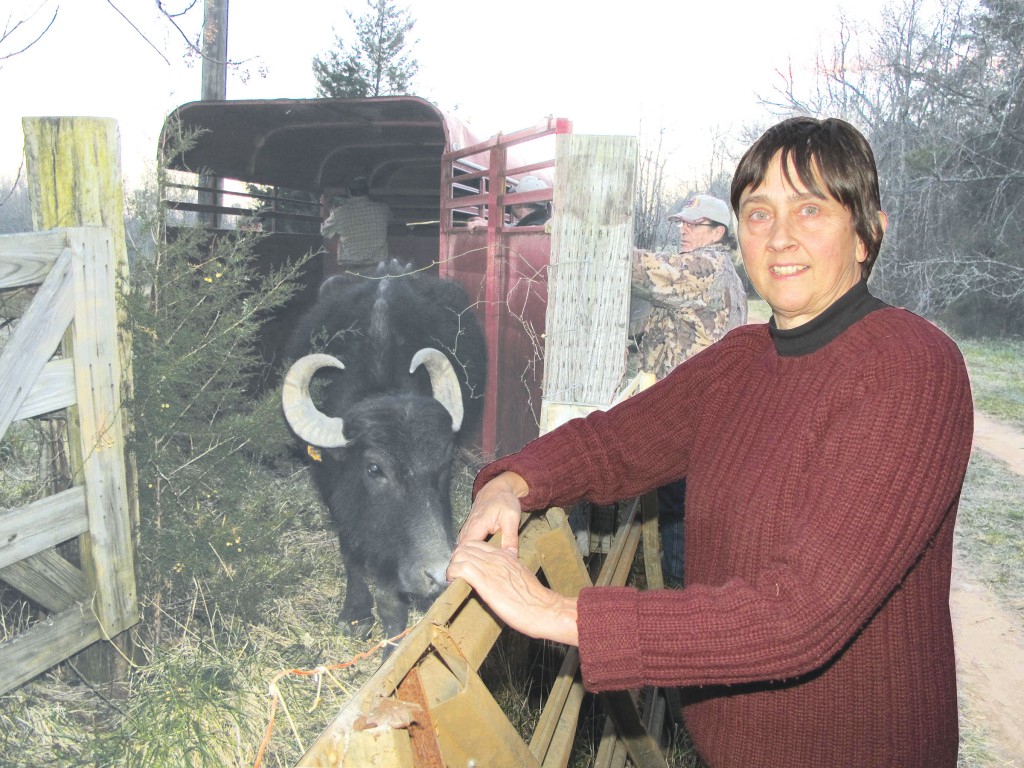
Landowner Pelham Lyles stands outside the holding pen as the buffalo are unloaded from the trailers.
Say Cheese: Asian Water Buffalo Find New Home in Fairfield
Like an updated, gourmet-food version of the Oregon Trail video game, Alvaro Valle, 32, has journeyed with his herd of Asian water buffalo from Gainesville, Fla. to Fairfield County over the course of three years, in search of affordable grazing pasture within a short drive of fine dining restaurants. Since purchasing his first heifer from the herd of his former graduate advisor at the University of Florida, where Valle received his master’s degree in Ecology in 2009, he’s been on a mission to produce what the New York Times called the “great white whale of American cheesemaking” – the near-fabled mozzarella di bufala.
In great demand by James Beard-awarded restaurants like Fig in Charleston, true Italian-style buffalo mozzarella is an artisanal cheese that can sell for $20-$30 per pound.
“There’s only about a handful of guys in the U.S. that are trying it,” Valle said, “because making this cheese is so difficult. It’s very different from the ‘buffalo mozzarella’ you might see at Costco for $4.50 a pound.”
He explained that there are three main requirements for making artisanal buffalo mozzarella – first, the milk has to be of the highest quality, which comes from the buffalo being as grass-fed as possible. Two, it needs to be eaten the same day it’s made, or within a day or two at the most. And three, it can’t be refrigerated.
“And of course,” he adds, “it’s a high-end product, so you need to be in a place that can sustain that. That’s why I moved to Fairfield County, to get into the culinary culture in Charleston. In the last couple of years, I was ready to build a dairy and start milking, but I wasn’t able to get traction with the right land there.”
Valle said he’s very pleased with the land that he’s now renting in Fairfield County from Pelham Lyles, a lifelong resident of Fairfield County and Director of the Fairfield County Museum. Valle said the location, just a few miles south of Winnsboro on Highway 34, is ideally located for working with restaurants in Charleston and Columbia.
Lyles’ 250-acre farm is part of an 1,100-acre farm that her grandfather purchased in parcels during the 1930s and ’40s.
“He ran a herd of 200 white-faced Herefords as a hobby,” Lyles recalled. Her father passed the land down to Lyles and her four siblings. “I had always dreamed of having a horse farm here on my farm, but I couldn’t afford the investment. I love the land. The opportunity to partner with Al has provided the ideal setting for his herd, and it provides me with a little income from my land.” Looking out across the open fields at the herd, Lyles added, “I really love having animals on the land again.”
“Before I found the land on Ms. Lyles’ farm,” Valle said, “I just stashed the herd where I could around the state – some in Kingstree, some on John’s Island, some down near the Edisto River. Now I’ll be able to have all the buffalo together within the month, and they’ll be ready to start milking by summertime.”
Valle was born in Nicaragua, but the family moved to the United States when he was a child. His parents, Alvaro and Lucia, live in Chattanooga, Tenn., where his father is a surgeon, and they are very supportive of Valle’s work with the buffalo.
“My mom grew up on a farm, and my dad always wanted to farm,” Valle said. “This is kind of a family venture. We’ve put family resources into it, and my dad is often part of the day-to-day decision-making. If the business takes off, I can see them moving here and becoming even more of a part of it.”
Valle’s mentor, the late Hugh Popenoe, was one of the foremost experts on water buffalo in the United States. He began importing them in the 1970s, and served as president of the American Water Buffalo Association.
“I wanted to farm, and to make an impact doing something that nobody else was doing,” Valle said. “I found this niche with my advisor, and I’d always felt comfortable with cattle, so that’s why I got into it.
“It’s hard work, but the buffalo are great to work with,” he said. “People sometimes think these are the same wild, fierce creatures you see on National Geographic, but the reality is that domesticated water buffalo are extremely docile. They’re also a great species for the southeast. Water buffalo have been in South Carolina since colonial times, and were used to farm rice fields in Charleston. They’re just more productive for this particular environment – they can subsist on lower-quality forage than a cow, and they gain more weight from the same amount of feed.”
Valle said he’s developed a good working relationship with his water buffalo over the years.
“My Australian Shepherd, Pipa, has a natural herding instinct with them, but they don’t need a lot of that yee-haw-ing,” he said with a smile. “They just come when they’re called.”










